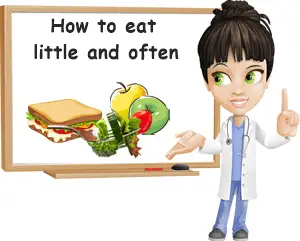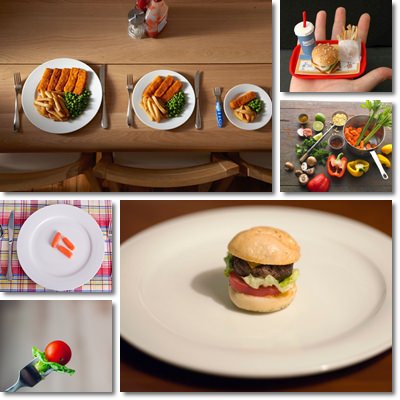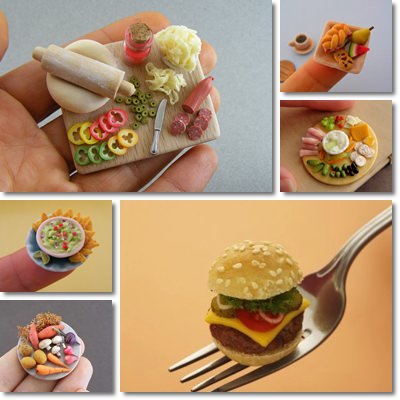Eating has become a truly problematic aspect of our busy lives. In addition to the issue of healthy eating, we now have to deal with the problem of finding the time to eat.
Because of this, many of us might feel it is okay to fill up on food early in the day because we might not have the time to sit down at the table until the end of the day.
But ingesting large amounts of food at once is not healthy eating. A large volume of food consumed in one sitting can engender serious gastric discomfort and put our body through significant effort when processing that much food at once.
Nutrition experts and members of the medical and scientific community recommend eating smaller meals frequently throughout the day because eating little and often is just as important as clean and healthy eating.
In other words, both the type of foods we eat and how we eat them matters if we want to be, feel and look healthy. Too much food at once will make us feel slow and heavy, but will also slow down many essential body processes and weigh down on how efficiently our body works as a whole, so we end up not enjoying the energy and health benefits we should by eating.

How to achieve eating less food, but more frequently?
Everyone is different so everyone will eventually find out what works for them when trying to eat little and often. We can enjoy anywhere from 6 to 10 small meals a day, on average amounting to a maximum of 2,000 kcal for women and 2,500 kcal for men[1]https://www.fda.gov/media/112972/download.
Here is what helps me eat smaller, more frequent meals throughout the day:
1) Using a smaller plate and eating slowly
Every time I eat something I go for the smaller or smallest plate I can find. And I now own several such dishes for this very purpose (which I have come to love using). This way I know that even when I fill it up, the food I end up eating won’t be that much. But what helps me the most is eating slowly.
I am a really slow eater so by the time everyone else has finished a big plate of food and still feels hungry, I have only gone through half my food and already feel satiated and happy.
2) Not finishing my food
One of the values my parents insisted on passing onto me was eating all of my food. As an adult, I do understand the importance of not wasting precious food or resources in general, and I am perfectly aware of the fact that I am privileged to have something to eat in the first place. So I generally serve myself smaller portions and when I know I am going to only eat half of what is on my plate, I either share it with my dog or feed it to a stray animal.
3) Avoiding all things processed
Eating an entire bag of chips might satisfy a craving, but not curb our hunger, so we end up eating more than we should. After learning this, I know that I am better off enjoying a salmon, lettuce and tomato sandwich, some grilled chicken with mashed broccoli, a handful of almonds or walnuts, some dried figs, plain yogurt with honey and some canned tuna or ricotta and two tablespoons of Nutella. After all, we need vitamins and dietary minerals, not empty calories.

4) Sticking to a schedule and not skipping meals
I find eating at around the same time helps me deal with hunger and cravings better. Also, I try not to skip breakfast, so I don’t run for the first bag of anything later, or dinner, so I don’t raid the fridge at night. I try to eat every two, three or four hours, depending on how often hunger hits me, and always have healthy, to-go snacks ready for when I have to work, but also eat.
5) Combining foods
I find combining foods is better than indulging in one type of food alone for curbing hunger and staying satiated longer. If I only eat carbohydrates, I may feel energized for a while, but I generally get hungry faster.
If I don’t eat protein, I often feel tired and don’t do well with running about. If I don’t eat fats, I feel my brain foggy and can’t think properly or focus on anything. So I like to eat two or three different things at once, to provide my body with all the nutrients it needs, but in small portions.
6) Listening to what my body tells me
Our body needs protein, carbohydrates and fats to keep us alive and healthy and it knows best the amounts it needs them in. Despite general recommendations of calorie intake or protein, fats or carbohydrates intake, age, current state of health, occupation, type of activity, gender etc. all influence our daily requirements.
When I crave fats, I eat fats. When I crave sugar or bread, simple carbohydrates, I eat simple carbohydrates. When I crave protein, I eat protein. I just make sure to eat slowly until I don’t feel hungry anymore and choose my sources for these nutrients as best I can.

Why should we eat little and often?
There are numerous benefits to eating smaller meals often throughout the day, including:
1) Stable blood sugar levels
When we eat little and often, we are supplying our body with lower, but constant levels of nutrients from food. This ensures a steady flow of vital nutrients and, consequently, stable levels of sugar (or glucose) in the blood.
When we eat too much at once, we tend to get energy spikes, or moments when we feel particularly energized as a result of a higher than normal or higher than needed level of sugar in the blood. But as soon as blood sugar levels go back to normal, we immediately experience a sort of energy low, so we end up feeling worse than if we had eaten less, but at regular intervals.
2) Good energy levels
Eating smaller meals often contributes to stabilizing blood sugar levels naturally. This means we don’t experience highs and lows so we tend to have a steady level of energy throughout the day, which translates in an overall good mood and simply appetite for doing things. Eating too much at once will give us an energy spike, which might not feel as good as it sounds, but, as soon as digestion is over, we might feel drained of energy.
3) Better mood
Enjoying smaller meals more often can help improve our mood. A regular, but moderate intake of food means there is a constant supply of nutrients to our blood and a constant flow of nutrients to our brain as well, because it needs to be fed too.
Our brain is responsible for regulating our mood and when we supply it with the nutrients it needs from food at regular intervals and in sufficient, but not excessive amounts, it will do its job properly and support the production of certain hormones and neurotransmitters involved in regulating mood.
4) Faster and improved digestion
When eating smaller meals often, our stomach never fills up completely. When there is still room left in it, stomach acid can work better and digest food easier, resulting in a faster and effortless digestion. What happens when you eat too much at once? Because of the pressure of the food, we risk having our stomach acid escape in the esophagus. When this happens, irritation and inflammation occur, engendering heartburn, acid reflux and other symptoms of gastroesophageal reflux disease.
5) Weight loss
Eating little and often generally means we have more control over what we eat because, in our mind, that smaller amount of food needs to satisfy our hunger up until the next meal. Choosing smaller portions of the right foods and combining them wisely so we supply our body with all it needs (carbohydrates, protein and fats) can make even the smallest of meals keep us satiated.
6) Greater freedom of movement
Eating little and often means we supply our body with sufficient food to give it the nutrients it needs to keep us energized, active and positive. Large meals cause bloating, cramps and indigestion, heartburn and acid reflux, hindering our freedom of movement significantly.
7) Falling asleep sooner
Enjoying smaller meals often means we also digest them quicker and can resume certain activities sooner than a larger meal would allow us to. With steady blood sugar levels, no hunger sensation, a positive mindset and a more efficient digestion, we get to go to bed sooner and enjoy a resting sleep.
Conclusion
Eating little and often is ideal for good health because we supply our body with the nutrients it needs, but not overwhelm it by eating a disproportionate amount of food at once. But this takes practice and perseverance because it’s so easy to watch one more episode of our favorite show or spend 20 more minutes on the phone or out with friends and postpone eating, although hungry, then raid the fridge mindlessly. We are all different and have different dietary needs so what may work for some of us might not prove the best solution for others. Eating little and often may be a trial and error experience at first, until we understand what our body demands of us in terms of nutrition and individual dietary needs.
References
| ↑1 | https://www.fda.gov/media/112972/download |
|---|
